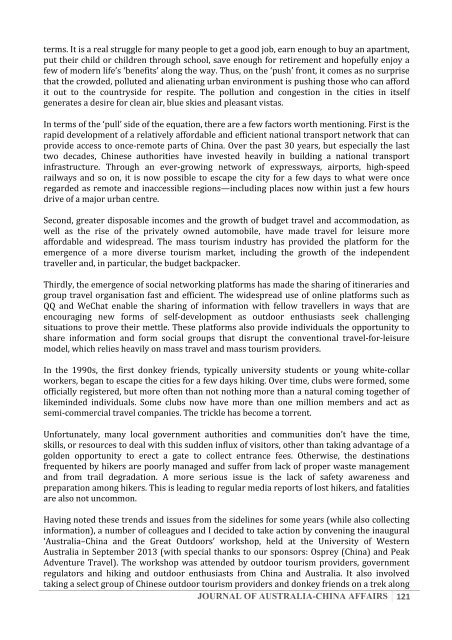Journal of Australia-China Affairs 2014
Journal of Australia-China Affairs 2014
Journal of Australia-China Affairs 2014
You also want an ePaper? Increase the reach of your titles
YUMPU automatically turns print PDFs into web optimized ePapers that Google loves.
terms. It is a real struggle for many people to get a good job, earn enough to buy an apartment, put their child or children through school, save enough for retirement and hopefully enjoy a few <strong>of</strong> modern life’s ‘benefits’ along the way. Thus, on the ‘push’ front, it comes as no surprise that the crowded, polluted and alienating urban environment is pushing those who can afford it out to the countryside for respite. The pollution and congestion in the cities in itself generates a desire for clean air, blue skies and pleasant vistas. In terms <strong>of</strong> the ‘pull’ side <strong>of</strong> the equation, there are a few factors worth mentioning. First is the rapid development <strong>of</strong> a relatively affordable and efficient national transport network that can provide access to once-‐remote parts <strong>of</strong> <strong>China</strong>. Over the past 30 years, but especially the last two decades, Chinese authorities have invested heavily in building a national transport infrastructure. Through an ever-‐growing network <strong>of</strong> expressways, airports, high-‐speed railways and so on, it is now possible to escape the city for a few days to what were once regarded as remote and inaccessible regions—including places now within just a few hours drive <strong>of</strong> a major urban centre. Second, greater disposable incomes and the growth <strong>of</strong> budget travel and accommodation, as well as the rise <strong>of</strong> the privately owned automobile, have made travel for leisure more affordable and widespread. The mass tourism industry has provided the platform for the emergence <strong>of</strong> a more diverse tourism market, including the growth <strong>of</strong> the independent traveller and, in particular, the budget backpacker. Thirdly, the emergence <strong>of</strong> social networking platforms has made the sharing <strong>of</strong> itineraries and group travel organisation fast and efficient. The widespread use <strong>of</strong> online platforms such as QQ and WeChat enable the sharing <strong>of</strong> information with fellow travellers in ways that are encouraging new forms <strong>of</strong> self-‐development as outdoor enthusiasts seek challenging situations to prove their mettle. These platforms also provide individuals the opportunity to share information and form social groups that disrupt the conventional travel-‐for-‐leisure model, which relies heavily on mass travel and mass tourism providers. In the 1990s, the first donkey friends, typically university students or young white-‐collar workers, began to escape the cities for a few days hiking. Over time, clubs were formed, some <strong>of</strong>ficially registered, but more <strong>of</strong>ten than not nothing more than a natural coming together <strong>of</strong> likeminded individuals. Some clubs now have more than one million members and act as semi-‐commercial travel companies. The trickle has become a torrent. Unfortunately, many local government authorities and communities don’t have the time, skills, or resources to deal with this sudden influx <strong>of</strong> visitors, other than taking advantage <strong>of</strong> a golden opportunity to erect a gate to collect entrance fees. Otherwise, the destinations frequented by hikers are poorly managed and suffer from lack <strong>of</strong> proper waste management and from trail degradation. A more serious issue is the lack <strong>of</strong> safety awareness and preparation among hikers. This is leading to regular media reports <strong>of</strong> lost hikers, and fatalities are also not uncommon. Having noted these trends and issues from the sidelines for some years (while also collecting information), a number <strong>of</strong> colleagues and I decided to take action by convening the inaugural ‘<strong>Australia</strong>–<strong>China</strong> and the Great Outdoors’ workshop, held at the University <strong>of</strong> Western <strong>Australia</strong> in September 2013 (with special thanks to our sponsors: Osprey (<strong>China</strong>) and Peak Adventure Travel). The workshop was attended by outdoor tourism providers, government regulators and hiking and outdoor enthusiasts from <strong>China</strong> and <strong>Australia</strong>. It also involved taking a select group <strong>of</strong> Chinese outdoor tourism providers and donkey friends on a trek along JOURNAL OF AUSTRALIA-CHINA AFFAIRS 121


